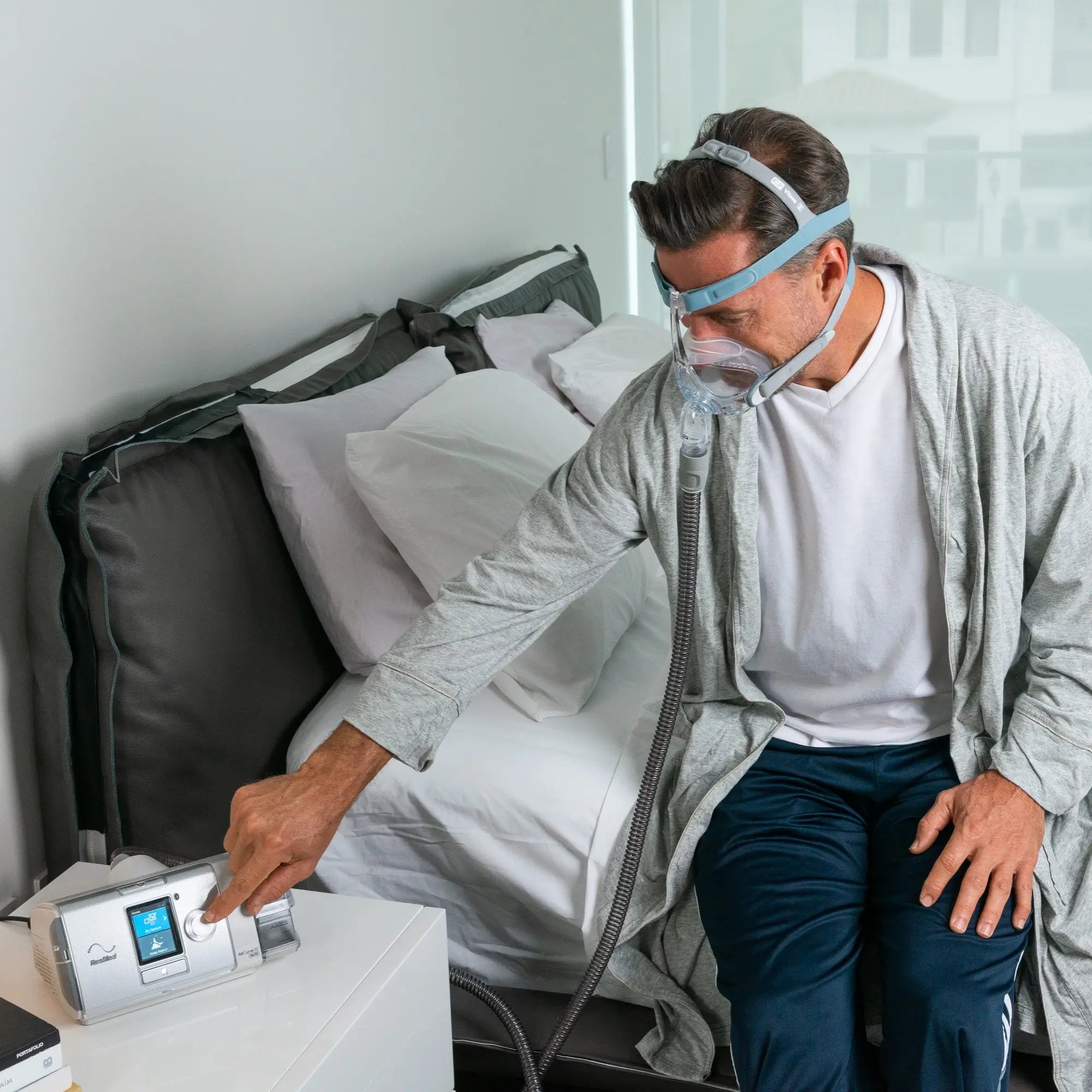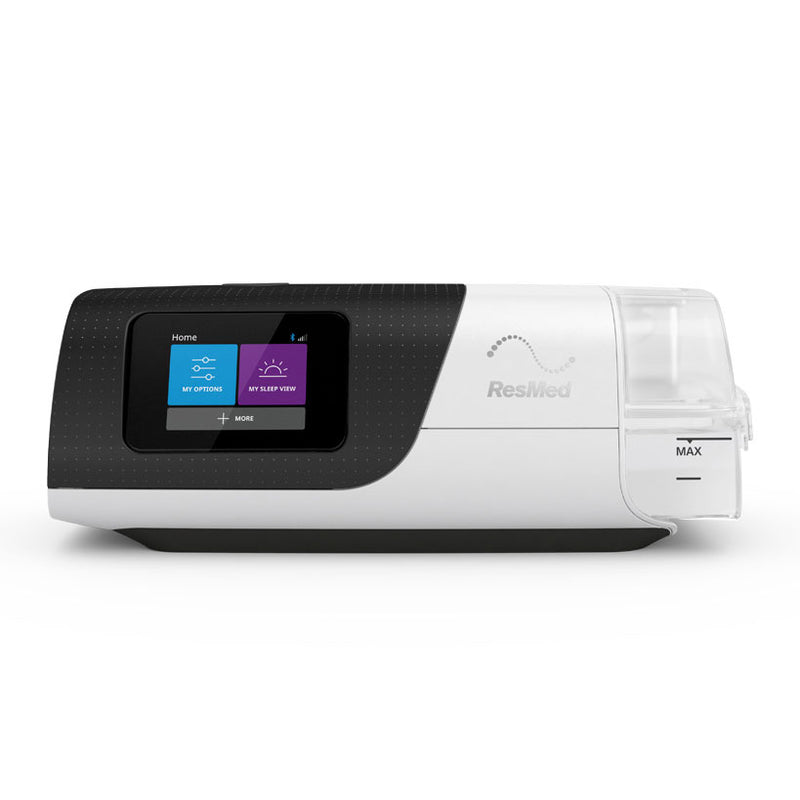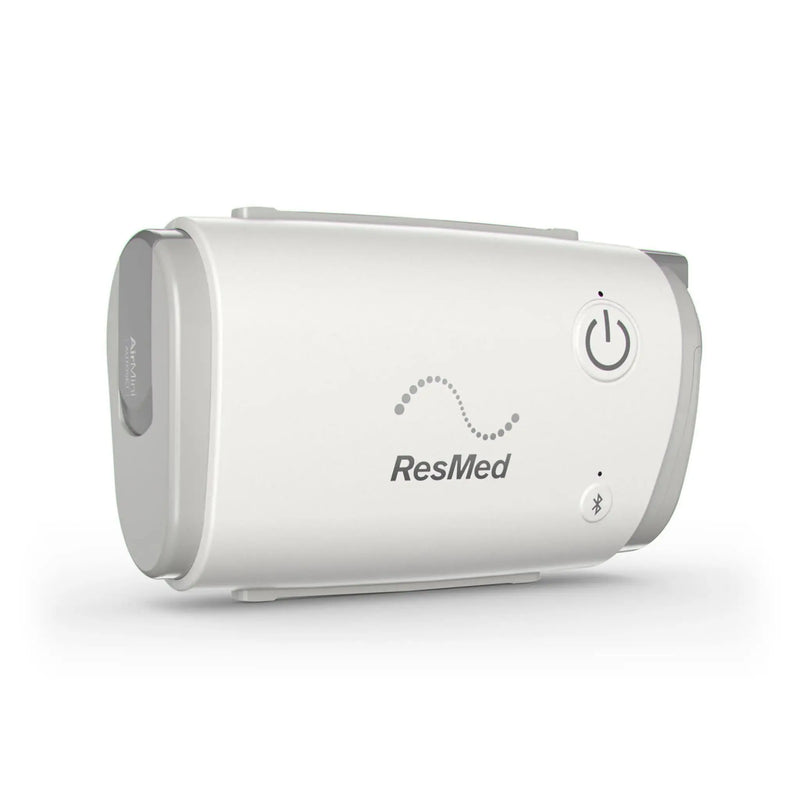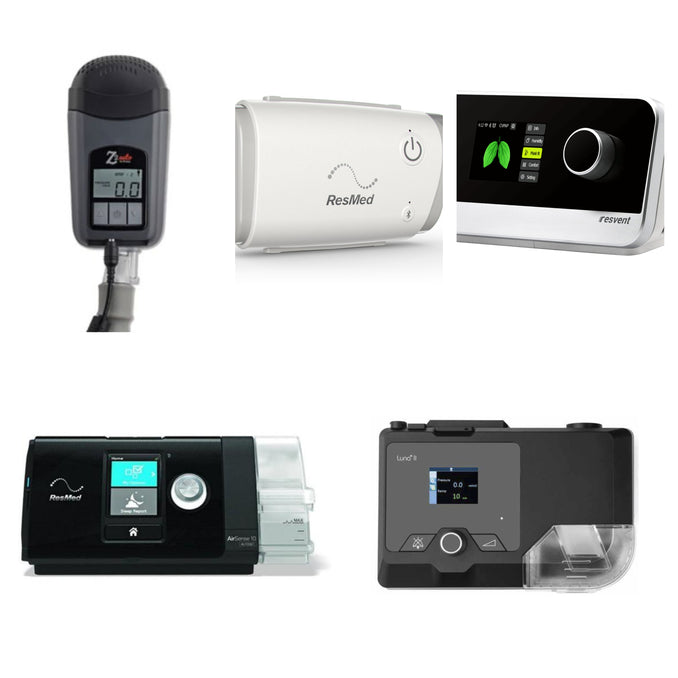CPAP therapy is the most common treatment for sleep apnea, but not all CPAP machines are created equal. There are different types of CPAP machines available in the market, and selecting between them can be an overwhelming task, especially for first-time users.]
Continue reading to get further details on every type of CPAP machine to help make your decision easier.
What Is a CPAP Machine?
Continuous Positive Airway Pressure (CPAP) machines are medical devices that are commonly used in obstructive sleep apnea (OSA) treatment, and in the treatment of other types of sleep apnea and sleep disorders.
Sleep apnea is a common sleep disorder suffered by millions of people around the world. This condition causes people to stop and start breathing multiple times while they sleep because their upper airway tends to collapse. Even though most people don’t realize that they have sleep apnea, it has adverse effects on their short-term and long-term health and quality of life.
CPAP machines are the prime treatment option for obstructive and some types of central sleep apnea, since they are designed to help keep the airway open during sleep.
This prevents the collapse of the soft tissues in the airway that occurs in people with sleep apnea. CPAP therapy works by delivering a steady stream of air at a determined level of air pressure through a CPAP mask that covers the nose or the nose and mouth. It is held in place by a chin strap or headgear (depending on the mask style).
Positive air pressure therapy allows people with sleep apnea to breathe normally and get a good night’s sleep.
Types of CPAP Machines
There are different types of CPAP machines available on the market, each with its own unique features and benefits. Whether you’re a new CPAP user or looking to upgrade your current CPAP device, understanding the differences between these types of devices can help you make an informed decision and improve the effectiveness of your sleep apnea treatment.

Below, you can learn more about the types of PAP machines you can find when trying to pick the CPAP machine that’s right for you:
Non-adjusting CPAP Machines
Non-adjusting CPAP machines were the first type of CPAP machines created. There are more advanced options on the market, but these CPAP machines are great for people who tolerate a stable air pressure level throughout the night, and those who change positions while they sleep.
The airflow delivered by these machines is always at the air pressure established in the pressure settings of the machine. This level of pressure is determined by a sleep specialist based on the severity of your sleep apnea, which is shown in your symptoms and the results of your sleep study.
How Does It Work?
Non-adjusting CPAP machines work by drawing in air from the room, filtering it, and then pressurizing it to the prescribed air pressure level. The pressurized air is then delivered through a tube and mask to the person’s airway.
Design Features
Non-adjusting CPAP machines come in a variety of designs and sizes, but all of them have some basic features in common. They usually have a control panel that allows you to adjust the pressure level and a humidifier chamber that can be filled with water to add moisture to the air delivered, and prevent dry mouth and nasal congestion —some of the most common side effects from the use of PAP devices. Some even have a heated humidifier to provide moist and warm air during your CPAP therapy sessions.
Benefits
Even though they don’t have the latest features, non-adjusting CPAP machines are still highly effective in treating sleep apnea and improving the quality of life of people who suffer from sleep apnea. They help reduce snoring, daytime sleepiness, and the risk of serious health conditions such as heart disease, strokes, and diabetes.
Cost
Non-adjusting CPAP machines are one of the most affordable options for PAP therapy, since they generally cost anywhere around $600 and $1,000.
Auto-adjusting CPAP Machines
Auto CPAP machines, also called auto-adjusting CPAP machines or APAP machines, are CPAP devices that automatically adjust the air pressure level based on the user’s breathing patterns. This can pose an advantage for people whose breathing patterns tend to vary throughout the night, which is common among people who change positions while they sleep.

How Does It Work?
Auto-adjusting CPAP machines work by using sensors to monitor the sleeper’s breathing pattern and adjust the air pressure level accordingly to make breathing easier. If the user’s breathing is shallow, the machine will reduce the air pressure. If the device senses that the person is breathing heavily, the machine will increase the air pressure. This ensures that the person always receives the optimal pressure level to keep their airway open.
Design Features
Auto-adjusting CPAP machines are similar to non-adjusting CPAP machines, but they have additional sensors and software to monitor the person’s breathing pattern. Their control panel allows the user to set their preferred air pressure range, and it usually has a ramp time setting that allows the pressure level to ramp up gradually as the night progresses to allow the user to fall asleep more easily.
Benefits
APAP machines are a good option for people who have difficulty tolerating a fixed air pressure level while they sleep. They are also useful for people whose sleep apnea severity varies throughout the night.
Cost
Auto-adjusting CPAP machines tend to be pricier than non-adjusting CPAP machines because of all the extra features they provide. The most popular APAP machines in the market, like the ResMed AirSense 10 AutoSet and the ResMed Airsense 11 AutoSet, can cost anywhere from $800 to $1,100, but you can find them on sale often below that price point on our website.
BiPAP Machines
BiLevel Positive Airway Pressure Machines deliver two different pressure levels: one during inhalation and the other during exhalation. These types of CPAP machines are great for people who have difficulty exhaling against constant high pressure, and for first-time CPAP users.
How Does It Work?
BiPAP machines work by delivering a higher pressure level when the person inhales, and a lower pressure level when they exhale. This is called Inspiratory Positive Airway Pressure (IPAP) and Expiratory Positive Airway Pressure (EPAP), and it makes it easier to breathe out against the air pressure delivered by the machine, reducing discomfort and making it easier to tolerate CPAP therapy.

![]() Design Features
Design Features
What sets BiPAP machines apart from other CPAP machines is the ability to choose two pressure settings instead of one in their control panel. They usually include features found in other types of CPAP machines, such as a heated humidifier chamber, and ramp time feature.
Benefits
BiPAP machines are a good option for people who experience difficulty exhaling against constant air pressure. They can also be useful for people with certain medical conditions, such as chronic obstructive pulmonary disease, and those who aren’t used to sleeping with a CPAP machine.
Cost
The cost of a BiPAP machine can vary depending on the model and the brand, but they usually cost around $1,000 and $2,000. One of the most popular models, the 3B Medical Luna G3 can be found for just under $2,000.
Travel CPAP Machines
Travel CPAP machines are a portable CPAP therapy option for people who need to use their CPAP device while they are away from home, especially when camping or doing other outdoor activities.

How Does It Work?
Travel CPAP machines usually work in the same way as non-adjusting CPAP machines, as they don’t have the space to pack in the features found in bigger CPAP machines, such as a heated humidifier chamber.
However, some of them do have auto-adjusting features. You also need to consider that you’ll need CPAP batteries to power up your Travel CPAP machine if you are in a situation where you don’t have access to a power outlet.
There are different battery options that can be used for their efficiency, performance, and durability. One of the most popular is the Medistorm battery with its Pilot-12 and Pilot-24 models. On the other hand, EXPRO batteries also offer high-quality options with their EXP96PRO and EXP48PRO models.

Design Features
Travel CPAP machines are smaller and lighter than other types of CPAP machines. They often have a built-in power supply or can be powered by batteries, since they are usually used by people when they don’t have access to a power outlet.
Benefits
This type of CPAP machine is great for people who travel frequently, or who frequently sleep away from home, and don’t want to take a bigger and heavier CPAP machine with them. They are approved for flight, so you can use them while you fly to your destination, and they are lightweight and portable, making them easier to transport and use on the go.
Cost
Travel CPAP machines cost varies depending on the features they offer, and they can go from $500 to $1,000. Z2 offers a standard and auto-adjusting version of a travel CPAP machine, and they have a price difference of $200.
Can CPAP Accessories Be Swapped Between Machine Types?
If you are a CPAP user looking for a new CPAP machine, or someone who is new to the world of CPAP machines, you may be wondering if you can interchange accessories between different types of CPAP machines.
CPAP accessories like masks, tubing, and filters can be used with any type of CPAP machine, but it’s always important to make sure they are compatible with the specific model of CPAP device being used.

For some accessories, such as the different types of CPAP masks, you not only need to make sure that they are compatible with your type of CPAP machine, but you also need to consider how they fit your face, and if they will be comfortable to use in your preferred sleeping position.
Which Machine Is Right for You?
Choosing the right type of CPAP machine depends on several factors, including the severity of your sleep apnea, your breathing patterns at night, and your individual preferences and needs.
•Non-auto-adjusting CPAP machines are a good option for people with mild to moderate sleep apnea who are able to tolerate a fixed air pressure level. They tend to be the most affordable option.
•Auto-adjusting CPAP machines are ideal for people with variable breathing patterns or who have difficulty tolerating a fixed air pressure level.
•BiPAP machines are great for people who have a constant breathing pattern but don’t tolerate high air pressure when breathing out.
•Travel CPAP machines are for people who travel often, people who are frequently on the move, and those who prefer a portable option when it comes to their medical devices.
If you are still on the fence regarding which type of CPAP machine to choose, your sleep specialist or primary healthcare provider can help you choose the ideal CPAP machine to meet your needs.
CPAP machines are the cornerstone of sleep apnea treatment, and over the years they have helped improve the quality of life of millions of people with this sleep disorder. There are several different types of CPAP machines, and by understanding the unique features and benefits of each one, you can find the right CPAP machine and accessories to improve your overall health and well-being.
Visit our online store now to explore our collection of CPAP machines. Invest in better sleep and wake up refreshed every day.



















































